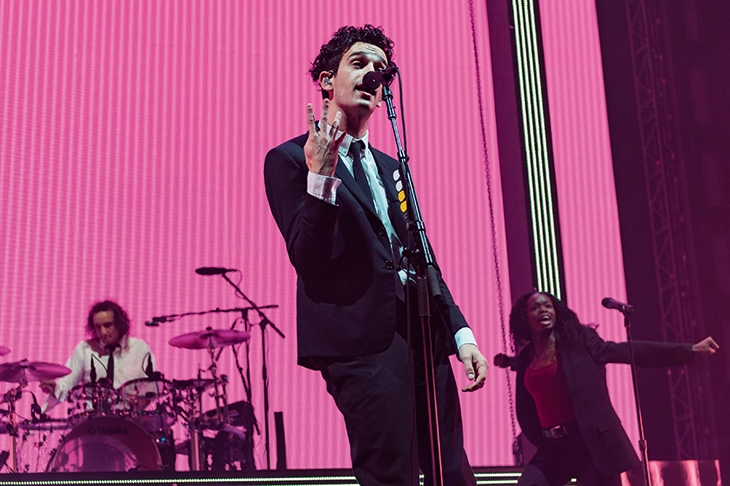The teenage girls are often right. They were right about Sinatra and they were right about Elvis. They were right about the Beatles and the Stones. They were right, too, about the 1975, whose emergence in 2013 playing tuneful and accessible pop-rock with unusually self-questioning lyrics was driven by a large and voluble following among those teenage girls. Naturally, that led a swathe of male critics to write them off. One dismissed them on the baffling grounds that their songs were ‘ridiculously catchy’, as if that were a bad thing; the NME proclaimed them the worst band in the world
Six years on, the critics have caught up. The 1975’s third album, A Brief Inquiry Into Online Relationships, was greeted with reviews that suggested they had more or less brought together the best bits of War and Peace, Abbey Road and Citizen Kane. These days the NME would rather smash its collective face into the wall than suggest that anything about the 1975 is less than perfect. The consensus now is that they are the most significant young band at work.
The consensus, in this case, is right. That’s down to the group’s singer, Matty Healy. The music is often very good — at their best, the 1975 are a fantastically melodic pop group with a fine feel for unusual textures and shadings, and a taste for mixing and matching unexpected elements (at their worst, as in a slightly flabby midsection of the show, they have a tendency to show off their arty tendencies, with ambient instrumentals and songs rather lacking in the actual tunes they’re so good at).
Healy was the focus of everything in this fabulous production: a heartthrob in black suit and tie at the start, though with his slightly sticking-out ears, and dancing that manages to be beautiful as well as awkward, he was oddly reminiscent of Stan Laurel.
He was transformed into a tourist in wooly hat, headphones and rucksack for ‘Sincerity is Scary’, the giant screen at the back of the stage a moving streetscape, Healy walking along a travelator at the front of the stage. During ‘The Ballad of Me and My Brain’, a podium raised him in front of the screen. He turned to it and pushed — a portal opened up and suddenly he was trapped inside an iPhone screen. It was a brilliant coup de théâtre.
The alienation caused by digital technology is one of Healy’s favoured themes (‘You said I’m full of diseases, your eyes were full of regret/ And then you took a picture of your salad, and put it on the internet,’ from ‘A Change of Heart’, one of the evening’s standouts, might be the sharpest, slyest couplet yet about the blurring of life and online existence) but really it’s just one representation of the single preoccupation that runs through almost all his writing: emptiness, and the search for anything to fill the void, be it drugs, sex, the internet, religion, whatever.
‘It’s Not Living (If It’s Not With You)’ — a jaunty, sunny pop song presented against primary colours on the screens, Healy and two dancers choreographed in sync — sounds like the soundtrack to a holiday romance; it’s actually about heroin addiction (one of the ways Healy sought to fill his void) and its everyday, shopping-centre soundtrack feeling made it oddly more transgressive than, say, the Velvet Underground being studiedly bohemian about the same subject.
The oldest song of the night, ‘Sex’, addressed the same spiritual vacancy, but this time in the form of a young adult narrator already so jaded that the prospect of oral sex seems like a waste of time.
With most groups, of course, this would be quite the most appalling heap of self-indulgent tosh. For God’s sake, stop whining! But Healy is so charming, so charismatic, so unselfpitying in manner that he can carry it off. The soul of Lou Reed, and the looks of Harry Styles. It’s a combination that goes a very long way indeed.






Comments